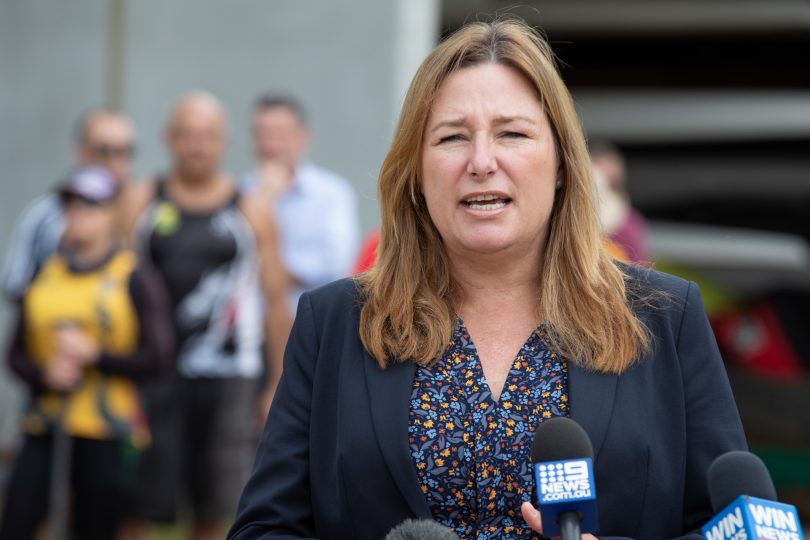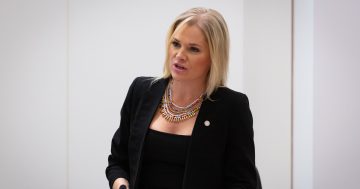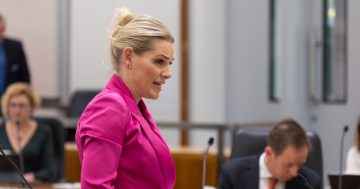
Minister for Prevention of Domestic and Family Violence Yvette Berry has engaged the Domestic Violence Prevention Council to advise coercive control legislation. Photo: Michelle Kroll.
The ACT Government has provided in-principle support to criminalising coercive control after Queensland announced its intent to legislate on the issue, but said it will first work with stakeholders to determine if there is a gap in current legislation.
Coercive control is where victims are subjected to controlling behaviour from their partner, including restricting access to money, where they go and who they meet.
Survivors often fear this type of partner behaviour will not be recognised as abuse by the police or courts because it’s different from physical violence.
The push to criminalise coercive control has been reinvigorated by the family of Hannah Clarke, who was killed along with her three children after being doused in petrol and set alight by her estranged husband in February last year.
Her family said Hannah and the children had been subjected to years of psychological abuse and controlling behaviour, including controlling what she wore, where she went and who she was visiting.
The ACT Government has included the term in the Family Violence Act, which means that coercive control can be used as grounds to apply for a family violence order.
Contravening a family violence order carries a maximum penalty of five years imprisonment, an $80,000 fine or both.
Principal Solicitor at the Women’s Legal Centre ACT, Claudia Maclean, said a new offence on top of family violence orders would need to be introduced to capture the insidious nature of coercive control and properly reflect this form of violence as a pattern of behaviour rather than a single event.
A criminal justice response must also include dedicated training, a robust evaluation framework informed by victim-survivor experience, and increased support resources for mental health, housing, drug and alcohol and legal services, she said.
“We can introduce new offences; however, if offences are not enforced, risk is assessed inconsistently, if people are not aware these offences exist and if we are not measuring whether these responses are reducing risk for victim-survivors and provide long term safety, then there is little utility in introducing new offences.
“There is no clear answer to stop family violence, where we need a range of options, holistic supports and significant resources which recognise the complex, devastating and long-term impact of family violence on victim-survivors and their children.”
Queensland recently announced a consultative task force that will speak with survivors, service providers, lawyers and the community and then advise the government on potential legislation to criminalise the practice.
Premier Annastacia Palaszczuk said the Queensland Government would introduce legislation in the next four years. Tasmania is currently the only Australian jurisdiction which explicitly criminalises the behaviour.
Deputy Chief Minister and Minister for Prevention of Domestic and Family Violence Yvette Berry referred the issue to the Domestic Violence Prevention Council in December last year.
An ACT Government spokesperson said the government is also consulting with the ACT Director of Prosecutions, ACT Victims of Crimes Commissioner, and other key criminal justice and community stakeholders to determine how best to proceed with criminalising coercive control.
“The ACT Government, through the Office of the Coordinator-General for Family Safety, is undertaking a range of projects focussed on improving community and service sector understandings of domestic violence and providing an integrated response to this type of violence,” the spokesperson said.
“The ACT Government believes that providing an integrated response focussed on building a shared and common understanding of domestic violence is essential to addressing the full range of coercive and controlling behaviours.”
The spokesperson said the government has also been working on social policies and programs like the ACT Domestic and Family Violence Risk Assessment and Management Framework, ACT Government Domestic and Family Violence Public Service Training and the Safety Action Pilot to increase awareness and understanding about domestic violence issues, including coercive control.
For more information about domestic violence and coercive control, visit the Domestic Violence Crisis Service.
Support is available through the DVCS 24/7 Crisis Line on 6280 0900 or through 1800 RESPECT.



















